
Bombycoidea is a superfamily of moths. It contains the silk moths, giant silk moths, sphinx moths, and relatives. The Lasiocampoidea are close relatives and were historically sometimes merged in this group. After many years of debate and shifting taxonomies, the most recent classifications treat the superfamily as containing 10 constituent families. Their larvae often exhibit horns.

The Arctiini are a tribe of tiger moths in the family Erebidae.

Gracillariidae is an important family of insects in the order Lepidoptera and the principal family of leaf miners that includes several economic, horticultural or recently invasive pest species such as the horse-chestnut leaf miner, Cameraria ohridella.
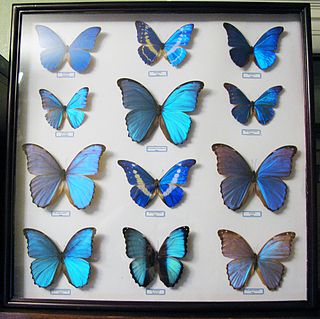
The Morphinae are a subfamily of Nymphalidae butterflies that includes the morphos, the owl butterflies (Caligo), and related lineages. It is either considered a sister group of the Satyrinae, or disassembled and included therein.

Nepticulidae is a family of very small moths with a worldwide distribution. They are characterised by eyecaps over the eyes. These pigmy moths or midget moths, as they are commonly known, include the smallest of all living moths, with a wingspan that can be as little as 3 mm in the case of the European pigmy sorrel moth, but more usually 3.5–10 mm. The wings of adult moths are narrow and lanceolate, sometimes with metallic markings, and with the venation very simplified compared to most other moths.
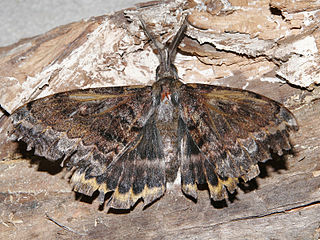
Anthelidae is a family of Australian lappet moths in the order Lepidoptera. It had earlier been considered to be part of the Lasiocampoidea superfamily, but a 2008 molecular phylogenetic study, supported by a 2011 study, resulted in reincluding the Anthelidae in the superfamily Bombycoidea.

Brahmaeidae is a family of insects in the order Lepidoptera, commonly known as Brahmin moths. It includes species formerly included in the family Lemoniidae.

The Bombycidae are a family of moths known as silkworm moths. The best-known species is Bombyx mori (Linnaeus), or domestic silk moth, native to northern China and domesticated for millennia. Another well-known species is Bombyx mandarina, also native to Asia.
The Cosmopterigidae are a family of insects in the order Lepidoptera. These are small moths with narrow wings whose tiny larvae feed internally on the leaves, seeds and stems of their host plants. About 1500 species are described. The taxonomic family is most diverse in the Australian and Pacific region with about 780 species.
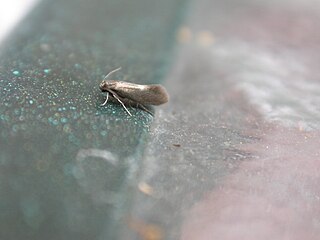
A family of primitive monotrysian moths in the order Lepidoptera, Heliozelidae are small, metallic day-flying moths with shiny smooth heads. In Europe the small adult moths are seldom noticed as they fly quite early in the spring. The larvae are leaf miners and the vacated leaf mines are distinctive because the larva leaves a large hole at the end.

Apatelodidae, the American silkworm moths, is a family of insects in the order Lepidoptera. They are a family within the superfamily Bombycoidea, though they have in the past been considered a subfamily of Bombycidae.
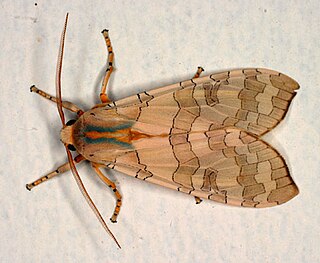
The Phaegopterina are a subtribe of tiger moths in the tribe Arctiini, which is part of the family Erebidae. The subtribe was described by William Forsell Kirby in 1892. 469 species of Phaegopterina are present and 52 that are recently discovered in Brazil.

Eois is a genus of moths in the family Geometridae. The genus contains about 250 validly described species, most from the Neotropical region. Many species are still undescribed and the total number of species is estimated to be over a 1,000 in the Neotropical region alone. The genus was first described by Jacob Hübner in 1818.

The Erionotini are a tribe of skipper butterflies in the subfamily Hesperiinae.
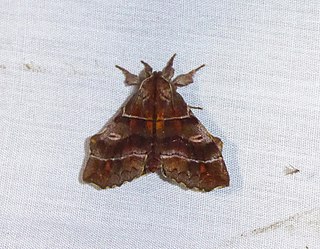
Zanola is a genus of moths in the family Apatelodidae.
Zanola aegina is a moth in the family Apatelodidae. It was described by Caspar Stoll in 1782. It is found in Suriname.
Zanola fieldi is a moth in the family Apatelodidae. It was described by William Schaus in 1910. It is found in Costa Rica.
Zanola lychnica is a moth in the family Apatelodidae. It was described by Paul Dognin in 1920. The type location is Upper Madre de Dios, probably referring to the Madre de Dios River in Peru.
Zanola poecila is a moth in the family Apatelodidae. It was described by Max Wilhelm Karl Draudt in 1929.
Zanola elongata is a moth in the family Apatelodidae. It was described by William Schaus in 1910. It is found in Costa Rica.













